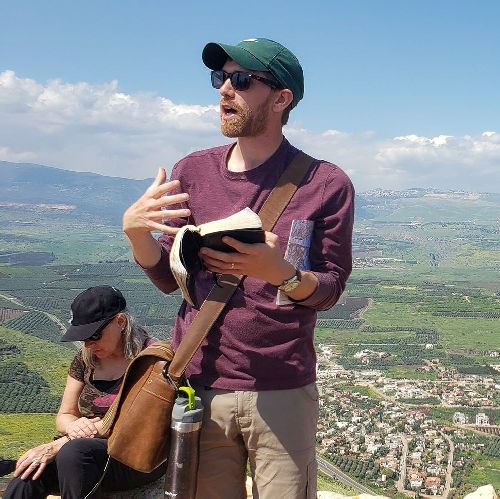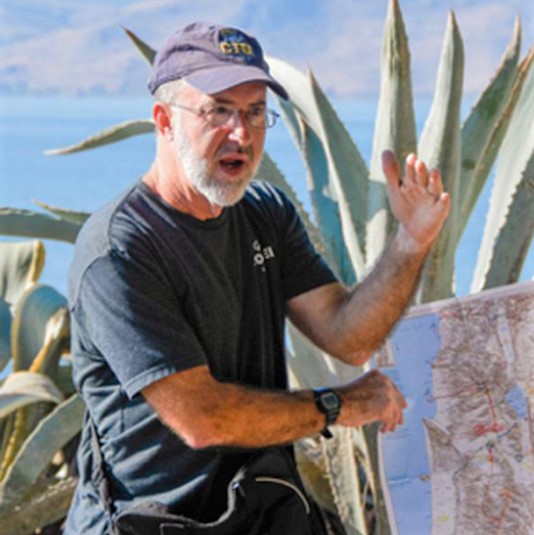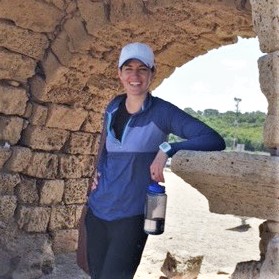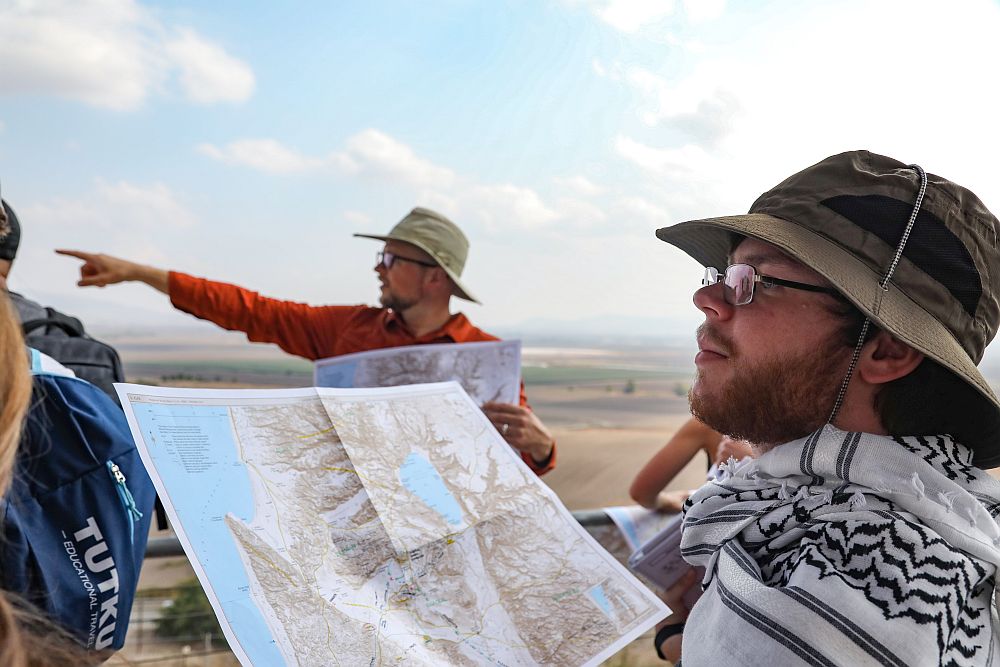
Historical and Geographical Settings of the Bible
Explore the lands of the Bible with our academically-qualified faculty members, and learn to “read” the land of the Bible in the process. Join the thousands of students who have experienced this course as a part of their Christian college or seminary training.
HISTORICAL AND GEOGRAPHICAL SETTINGS
Three Weeks. 150 Miles.
One Changed Perspective.
What You Will Learn
This intensive three-week course will introduce you to the geography, history, and archaeology of Israel. You will begin to feel at home on the playing field of biblical history after traveling through the land of the Bible. We visit biblical sites in nearly every corner of Israel and engage the biblical text in the field using custom maps, reference material, and lectures.
What You Will Do
You will walk the streets of Jerusalem to understand aspects of the biblical and modern city. Explore archaeological ruins from the time of Hezekiah. Visit Jesus’ backyard to understand his life and ministry. Hike through the canyon of a desert oasis. Learn how the biblical writers were influenced by the land of the Bible. And much, much more. Students and participants in this program will primarily use the maps and resources created by Biblical Backgrounds.
When It Is Offered
- January
- May
- June
Ready to Apply?
Follow the link below to submit your application to JUC.
Click here to apply!The Details
Sample Itinerary*
This is an example daily itinerary for the Historical and Geographical Settings of the Bible program:
Day 1: Arrival Day and Housing Check-In
Day 2: Program Orientation and Old City Walk
- The Four Quarters of the Old City of Jerusalem
Day 3-4: Old and New Testament Jerusalem Walks
- Mount Zion
- City of David
- Western Wall
- Church of the Holy Sepulchre
- Southern Steps of the Temple Mount
- Pools of Bethesda
Day 5: Jerusalem Approaches Field Study
- Mount of Olives
- Bethlehem
- Shepherd’s Field
- Church of the Nativity
- Herodium
Day 6: Benjamin Field Study
- Wadi Qilt/Judean Wilderness
- Old Testament Jericho
- Nebi Samwil
- Gezer
- Gibeah
Day 7: Exploration Day
Day 8: Exam and Field Study Preview
Day 9: Judah, Shephelah, Philistia Field Study
- Beth Shemesh
- Valley of Elah
- Bet Guvrin
- Lachish
- Ashkelon
Day 10: Negev and Great Wilderness Field Study
- Beersheba
- Arad
- Ein Avdat
- Avdat
- Makhtesh Ramon
Day 11: The Dead Sea Area Field Study
- Masada
- Ein Gedi
- Qumran
- Dead Sea beach for swimming
Day 12: Samaria Field Study
- Shiloh
- Jacob’s Well
- Shechem
- Samaria/Sebaste
- Mount Gerazim
Day 13: Exploration Day
Day 14: Exam and Field Study Preview
Day 15: Sharon Plain and Jezreel Valley Field Study
- Caesarea
- Mount Carmel
- Megiddo
- Jezreel Valley
- Beth She'an/Scythopolis
Day 16: Upper/Lower Galilee Field Study
- Nazareth
- Sepphoris
- Mount Arbel
Day 17: Huleh Basin and Golan Heights Field Study
- Hazor
- Dan
- Banias/Caesarea Philippi
- Golan/Damascus Road
Day 18: Sea of Galilee Field Study
- Capernaum
- Magdala
- Tabgha/Primacy of Peter
- Chorazin
- Mount of Beatitudes
- Kursi
- Sea of Galilee
Day 19: Exam and Departure Meeting
Day 20: Exploration Day
Day 21: Departure Day
Jordan Field Study (Optional):
Join a field study to Jordan for three days at the end of your program.**
View the average daily itinerary in Jordan and learn more about this field study.
Day 1 (Day 20): Gilead and Moab
- Jerash
- Jabbok River
- Moabite capital of Dibon
- Arnon Gorge
Day 2 (Day 21): Edom and the Nabateans
- Petra
- Edomite capital of Bozrah
Day 3 (Day 22): Ammon and the Medeba Plateau
- Ammonite capital of Rabbah/Amman Citadel
- Madaba
- Mount Nebo
Day 4 (Day 23): Departure Day
*All itineraries are subject to change due to logistical
reasons or the preference of the instructor or group leader.
Your final program calendar will be presented to you upon arrival.
**The Jordan Extension requires a minimum of seven
participants.
Short-Term Studies Program Faculty

Paul Wright, Ph.D.

Spencer Elliott, M.A.

Elaine Phillips, Ph.D.

Perry Phillips, Ph.D.

John (Jack) Beck, Ph.D.

Bryan Beyer, Ph.D.

Aubrey Taylor McClain, Ph.D.

John Monson, Ph.D.

Cynthia Parker, Ph.D.

Rebecca Pettit, M.A.

Carl Rasmussen, Ph.D.

Brian Schultz, Ph.D.

Emily Thomassen, M.A.

Chandler Collins, M.A.
Important Information
JUC offers both on- and off-campus housing for our short-term students on nights when they will stay in Jerusalem. We also arrange accommodations with hotels when the class is traveling for field studies. The hotels furnish buffet-style breakfasts and dinners. JUC students are provided with lunches by JUC whether in Jerusalem or on field studies.
Jerusalem Off-Campus Housing
Students can choose hotel housing rather than JUC campus housing for an increased housing fee. While JUC cannot guarantee that students will stay at any particular place, each hotel we contract with is well-rated and in or adjacent to the Old City of Jerusalem.
Jerusalem On-Campus Housing
Students who opt to spend nights in Jerusalem on campus will stay in dormitory-style housing, with 2-6 persons (or sometimes more) to a room. The campus has limited housing for couples with no double beds available. According to season and demand, private rooms for couples on campus may be available. Shared bathroom facilities are a short walk away from each room, sometimes across a courtyard and up or down a flight of stairs.
JUC’s program is academically and physically rigorous, including up to twelve hour days in the field or longer. The field studies involve hours of walking, standing, and several hikes (although some are optional). There are usually opportunities to sit throughout the day and plenty of time on the bus. However, students should expect an intensely physical program and plan to sweat.
Everyone traveling to Israel must have a passport that expires at least six months after they plan to exit the country at the end of their program.
Short-term students who travel from countries that have normal relations with Israel will be issued a three-month tourist visa upon arrival. Students from the United States, Canada, and most European countries fall under this category. Students who come from countries that do not have normal relations with Israel will need to make prior visa arrangements before entering the country.
Read more about obtaining tourist visas here.
Students from countries who do not have a regular relationship with Israel may need additional security or immigration approval to study in Israel. Students from such countries may be responsible to apply for a visa at their nearest Israeli Consulate or Embassy, or JUC may need to apply on their behalf at the Ministry of Interior in Jerusalem. Visa decisions are entirely at the discretion of the Ministry of Interior, so JUC cannot guarantee that you will be able to obtain a visa successfully. Please contact us if you are from a country that does not have a regular relationship with Israel and have questions about this process.
Please note: if you plan to participate in the Jordan Extension and you are required to secure an entry visa into Israel prior to the start of the program, you MUST request and be granted a visa allowing multiple entries into Israel.
Yes! If you are interested in combining our 3-week Historical and Geographical Settings of the Bible program with our 2-week Jesus and His Times program, you may take both back to back. This would be a combined total of 6 academic credits unless you choose to audit the programs.
A suggested packing list for JUC students is available in our student manuals. For long-term students who will be at JUC for a semester or more, here is a list of what to pack. For short-term students who will be at JUC for a few weeks, here is a list of what to pack.
We take the safety of our students with the utmost seriousness and have a proven track record of operating for over 60 years in the Holy Land. Click here for detailed information about how JUC handles local issues related to safety and prepares students to do the same.
Contact Us
Send us a note and we'll be in touch.





